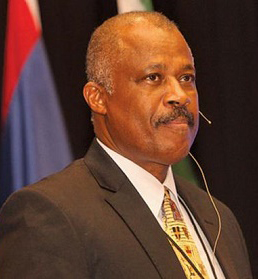KINGSTON, Jamaica, CMC – Renowned regional academic Professor Sir Hilary Beckles said it was critical cricket’s world governing body, the International Cricket Council (ICC) heeded the call of the Caribbean community, in helping to solve the governance crisis in West Indies cricket.
The Vice-Chancellor of the University of the West Indies said the Caribbean side had been a key player in the expansion of the global game, providing a “new performance culture” while also generating “a box office bonanza for five solid decades” and as such, had a role to play in ending the current impasse.
CARICOM had requested a meeting with the ICC during the Commonwealth Heads of Government in London this week to discuss the governance crisis only to be told their representatives would be busy preparing for their quarterly board meetings in Kolkata from April 21-26.
“CARICOM has been respectful of the International Cricket Council in its request for a discourse,” said Sir Hilary, who has written several books on West Indies cricket.
“The ICC knows, and should be respectful of the fact, that West Indian cricketers rescued the dying Test game after the Second World War, and gave it a new performance culture that captured the global imagination.
“In the process, the celebrated West Indian brand was born and has generated a box office bonanza for five solid decades.”
Following the two-day Intersessional in Haiti last February, CARICOM adopted legal advice which confirmed it could challenge CWI’s right, as a private entity, to manage the public good of West Indies cricket.
And the regional nation grouping said it would request a meeting with the ICC to convey what it termed the “desperate urgency” of reforming the governance structure in the Caribbean.
Labelling regional governments as a “major financial stakeholder”, Sir Hilary underscored the importance of ICC approaching CARICOM’s requests with a level of “ gratitude and generosity.”
“The ICC sits on a mountain that is filled with West Indian gold. It should therefore be mindful of the need to hear the West Indian case from the people and their governments,” argued Sir Hilary, a former director of Cricket West Indies.
“CARICOM is not asking for any special dispensation. It is insisting that as the major financial stakeholder, there has to be internal restructuring using best practices that have long been upheld by the ICC itself.
“This is a necessary beginning to end the standoff between cricket officials, community and governments. The present circumstance is not sustainable. CARICOM has every right to expect from the ICC, a respectful level of gratitude and generosity.
“Through our governments it must hear the voice of reason and the cry of the community.”
Sir Hilary was also careful to reiterate that CARICOM had no interest in personally taking charge of the running of West Indies cricket, only to resolve the governance issue.
“The depth of gratitude the ICC owes the West Indian people can be respected by an engagement in high level discussions with West Indian governments,” the former UWI Cave Hill principal stressed.
“Their objective is not to manage West Indies cricket, but to resolve a crippling governance crisis that has driven a wedge between the people and the game they love, and for a century, invested all of what they possessed.”
In a recent letter to CARICOM, the ICC said it was willing to meet in November during the Women’s Twenty20 World Cup in the Caribbean but insisted CWI president, Dave Cameron, needed to be present.










